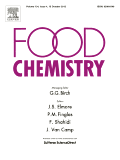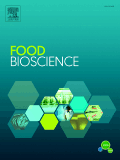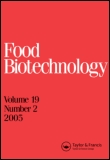
FOOD TECHNOLOGY AND BIOTECHNOLOGY
Scope & Guideline
Advancing the Future of Food Science and Biotechnology
Introduction
Aims and Scopes
- Food Quality and Safety:
Research on methods and technologies aimed at improving the quality and safety of food products, including microbiological, chemical, and sensory evaluations. - Biotechnological Applications in Food Production:
Studies that explore the use of biotechnological techniques in food production processes, including fermentation, enzyme applications, and the development of functional foods. - Nutritional Science and Health:
Investigations into the nutritional aspects of foods, including the health benefits of bioactive compounds and their role in disease prevention. - Sustainable Food Processing:
Research focusing on sustainable practices in food processing and production, including waste reduction, resource efficiency, and the use of alternative ingredients. - Innovative Food Products Development:
Development and characterization of novel food products, including plant-based alternatives, functional foods, and products with enhanced sensory properties. - Food Packaging Technologies:
Studies on packaging materials and technologies that enhance food preservation and safety, including the use of biodegradable and active packaging solutions.
Trending and Emerging
- Functional Foods and Nutraceuticals:
There is an increasing emphasis on the development and evaluation of functional foods, which offer health benefits beyond basic nutrition, reflecting consumer demand for health-promoting products. - Plant-Based and Alternative Proteins:
A significant rise in research related to plant-based food innovations and alternative protein sources indicates a shift towards sustainable and ethical food production. - Natural Antioxidants and Preservatives:
Research on natural preservatives, including plant extracts and essential oils, is gaining momentum as consumers seek cleaner labels and healthier food options. - Food Waste Valorization:
Emerging studies focus on innovative methods for converting food waste into valuable products, highlighting sustainability and circular economy principles within the food sector. - Smart Food Packaging and Preservation Technologies:
Advancements in smart packaging technologies that enhance food safety and shelf life through innovative materials and active packaging solutions are increasingly prevalent. - Biotechnological Innovations in Fermentation:
Research related to novel fermentation processes and microbial applications in food production is on the rise, reflecting a renewed interest in traditional practices enhanced by modern technology.
Declining or Waning
- Traditional Food Preservation Methods:
Research on conventional food preservation techniques, such as drying and salting, has seen a decline as newer, more innovative preservation technologies gain popularity. - Chemical Additives and Synthetic Preservatives:
There is a noticeable decrease in studies focusing on the use of artificial additives and preservatives, as there is a growing preference for natural alternatives and clean label products. - Animal-Based Food Products:
Research on traditional animal-based food products is diminishing, likely due to the increasing interest in plant-based alternatives and alternative protein sources. - Food Safety Regulations and Compliance:
While still relevant, there has been a shift away from regulatory compliance studies towards more practical applications and innovations in food safety. - Conventional Agricultural Practices:
Research related to conventional farming methods is declining in favor of studies on sustainable agriculture, organic farming, and agroecological approaches.
Similar Journals

Journal of Future Foods
Connecting researchers to shape the future of food.Welcome to the Journal of Future Foods, a prominent peer-reviewed publication dedicated to advancing knowledge and innovation within the realms of Agricultural and Biological Sciences, Food Science, and Nutrition and Dietetics. Published by KEAI PUBLISHING LTD in China, this journal has rapidly achieved a distinguished reputation, reflected in its impressive Q1 category ranking for both Agricultural and Biological Sciences and Food Science, along with a strong standing in Nutrition and Dietetics. The journal, which spans the period from 2021 to 2025, is committed to fostering interdisciplinary research that addresses the challenges and opportunities presented by the future of food. With a focus on open access, the Journal of Future Foods aims to disseminate crucial findings and foster collaborative dialogue among researchers, professionals, and students alike. By submitting your work, you not only contribute to cutting-edge advancements in the field but also join a vibrant community engaged in redefining the future of food systems.

COMPREHENSIVE REVIEWS IN FOOD SCIENCE AND FOOD SAFETY
Advancing Knowledge in Food Safety and ScienceCOMPREHENSIVE REVIEWS IN FOOD SCIENCE AND FOOD SAFETY, published by Wiley, is a premier journal dedicated to advancing the understanding of food science and safety through thorough and critical reviews. With an impressive Q1 ranking in the field of Food Science and a notable Scopus ranking of #4 out of 389 in Agricultural and Biological Sciences, this journal occupies a vital position within the academic community. Its rigorous approach to publishing comprehensive reviews serves as an invaluable resource for researchers, professionals, and students aiming to stay abreast of current trends and advancements in the food sector. Although the journal does not offer open access options, its contributions from 2002 through 2024 reflect a commitment to high-quality scholarship and knowledge dissemination. Researchers looking to elevate their understanding of food safety and related disciplines will find this journal an essential addition to their academic repertoire.

Food Chemistry
Decoding the Secrets of Food ChemistryFood Chemistry, published by Elsevier Science Ltd, is a leading international journal dedicated to the publication of high-quality research in the field of food chemistry. Established in 1976, this journal has made a significant impact in its realm, with an impressive 2023 impact factor and ranked Q1 in Analytical Chemistry, Food Science, and miscellaneous Medicine categories. It currently holds a remarkable Scopus ranking of #3 in Analytical Chemistry and #11 in Food Science, signifying its relevance and prestige among the top scholarly publications. With a wide scope that includes the chemistry of food composition, flavor, and safety, Food Chemistry serves as an essential resource for researchers, professionals, and students alike, offering insights and advancements in food analysis and technology. Access options may vary, and the journal is committed to disseminating innovative findings to foster knowledge and application in the dynamic field of food science.

Applied Food Biotechnology
Empowering global collaboration in food biotechnology.Applied Food Biotechnology is a dynamic and engaging open-access journal dedicated to the interdisciplinary field of food biotechnology, published by Shahid Beheshti University of Medical Sciences, Faculty of Medicine. Since its inception in 2014, this journal has provided a platform for the dissemination of cutting-edge research that combines aspects of applied microbiology, biotechnology, and food science, significantly contributing to advancements in food safety, processing, and nutritional enhancement. With an impressive impact factor, the journal ranks Q3 in multiple relevant categories, including Applied Microbiology and Biotechnology, Biotechnology, and Food Science in 2023, highlighting its influence within these fields. The journal's scope encourages innovative studies that investigate the utilization of biological processes in food technology, aiming to foster both scientific inquiry and practical applications across diverse demographics. With its commitment to open access, Applied Food Biotechnology ensures that all research findings are readily available to researchers, professionals, and students globally, enhancing collaboration and knowledge sharing. Located in Tehran, Iran, this journal serves as a vital resource for anyone invested in the future of food biotechnology.

Food Bioscience
Connecting Research to Real-World Food SolutionsFood Bioscience is a leading peer-reviewed journal published by Elsevier, dedicated to advancing the understanding of the complex interplay between food science and biosciences. With an impressive Impact Factor that places it in the Q1 and Q2 quartiles for Food Science and Biochemistry respectively, the journal consistently ranks among the top publications in its field, reflected in its Scopus rankings (Rank #83/389 in Food Science and Rank #175/438 in Biochemistry). Since its inception in 2013, Food Bioscience has fostered a multidisciplinary approach, bridging gaps between research in agricultural, biological, and food sciences, thus encouraging innovative solutions to the pressing challenges facing the global food supply chain. Although it currently operates under a subscription model, the journal is committed to disseminating high-quality research, making significant contributions to both academic scholarship and industry practices. Researchers, professionals, and students alike are invited to explore the wealth of knowledge contained within its pages as it plays a pivotal role in shaping the future of food bioscience.

Foods
Empowering Ideas in Food Science and Microbiology.Foods is a premier open access journal published by MDPI, based in Switzerland, that has been at the forefront of disseminating high-quality research in the fields of food science, health professions, and plant science since its establishment in 2012. With an impressive convergence of interdisciplinary studies spanning various aspects of food, nutrition, and microbiology, the journal aims to provide a comprehensive platform for researchers and professionals to share innovative ideas and findings. Maintained as a Q1 journal in multiple categories for 2023, including Food Science and Health Professions, Foods has garnered significant recognition within the academic community, reflected in its strong Scopus rankings and percentiles across various disciplines. The journal not only promotes open access to enhance the visibility and accessibility of research but also encourages the exploration of sustainable food systems and health-related issues, thus contributing to essential discussions in today's society. For those looking to advance their understanding and expertise in food-related sciences, Foods serves as an enduring resource for groundbreaking studies and critical insights.

Food Production Processing and Nutrition
Connecting food production and nutrition for global impact.Food Production Processing and Nutrition, published by SpringerNature, stands at the forefront of advancing knowledge in the vibrant fields of food science, nutrition, and public health. This esteemed Open Access journal, operational since 2019, plays a pivotal role in disseminating breakthrough research that intersects food production processes with nutritional insights, making it an invaluable resource for researchers, professionals, and students alike. With a commendable 2023 impact factor reflecting its robust scholarly contributions — Q1 in Food Science and Q2 in both Nutrition and Dietetics and Public Health, Environmental and Occupational Health — the journal not only emphasizes the importance of innovative food processing methods but also addresses pressing nutritional challenges faced globally. Located in the United Kingdom, it claims an impressive Scopus ranking, with a notable percentile standing across various categorical metrics. As such, Food Production Processing and Nutrition is essential for anyone aiming to deepen their understanding of how food systems impact public health through effective processing and nutritional strategies.

ACS Food Science & Technology
Exploring the Chemistry of Culinary InnovationACS Food Science & Technology is a premier peer-reviewed journal published by the American Chemical Society (ACS) that addresses the dynamic intersections of food science, chemistry, and technology. With its E-ISSN: 2692-1944, this journal aims to disseminate innovative research and comprehensive reviews that enhance understanding in fields such as analytical chemistry, organic chemistry, and general food science. Despite the absence of an Open Access model, its position in the Q2 quartile for multiple categories in 2023 underscores its significant impact on the scholarly landscape, ensuring researchers can access high-quality research pertinent to today's food challenges. With an expanding timeline of 2021 to 2024, ACS Food Science & Technology is poised to be an essential resource for advancing the scientific community's knowledge, fostering collaboration, and bridging gaps between academia and industry.

Journal of Food Science and Technology-Ukraine
Championing the Future of Food Technology and SafetyJournal of Food Science and Technology-Ukraine, published by the Odesa National University of Technology, stands as a pivotal platform dedicated to the dissemination of high-quality research in the field of food science and technology. With its open access policy established in 2014, the journal fosters global knowledge sharing and accessibility, enabling researchers, professionals, and students to access critical findings and advancements in food technology without barriers. The journal's commitment to publishing innovative studies, reviews, and case analyses reinforces its role in addressing contemporary challenges in food safety, preservation, processing, and nutritional quality. With ISSN 2073-8684 and E-ISSN 2409-7004, it serves as a valuable resource for the academic community, supporting the advancement of food science knowledge and its practical applications.

FOOD BIOTECHNOLOGY
Advancing the Future of Food Science and BiotechnologyFOOD BIOTECHNOLOGY is an essential journal for those engaged in the rapidly evolving fields of food science, biotechnology, and applied microbiology. Published by Taylor & Francis Inc., this journal has been a prominent platform since its inception in 1987, with a convergence of insights expected to continue until 2024. With an ISSN of 0890-5436 and an E-ISSN of 1532-4249, it holds significant academic weight, reflected in its 2023 rankings which place it in the Q3 category for both Applied Microbiology and Biotechnology and Biotechnology, alongside a stronger Q2 classification in Food Science. Although it currently does not operate as an open-access journal, its contributions to food biotechnology are invaluable for researchers, professionals, and students alike, providing a rigorous peer-reviewed outlet for innovative studies that advance the understanding of food processing, safety, and biotechnological applications. The journal’s relevance is further underscored by its Scopus rankings, which position it within the top tiers of its respective categories, making it a critical resource for the scientific community aiming to pioneer advancements in food biotechnology.